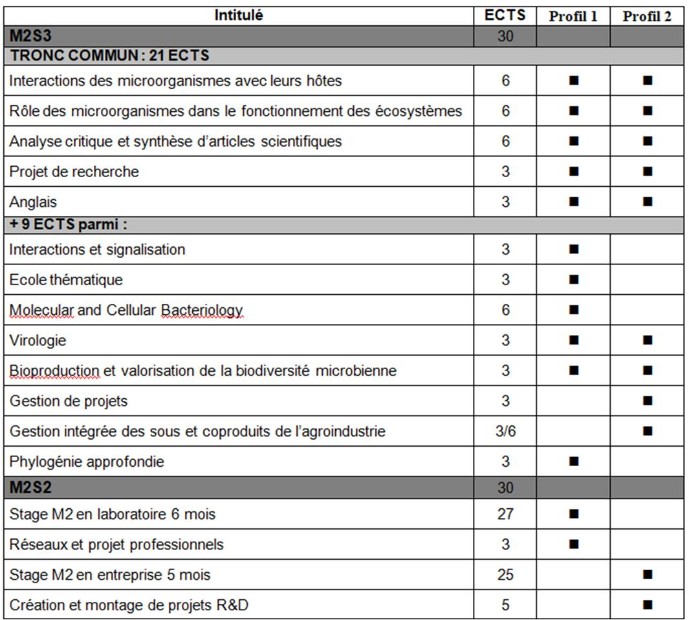ECTS
60 credits
Duration
1 year
Training structure
Faculty of Science
Language(s) of instruction
French
Presentation
The second year of the IMHE Master's program builds on the fundamental and applied knowledge acquired in the first year, as well as the associated skills. Students interact with numerous researchers who come to present their research work on topics related to the molecular mechanisms of interactions between microorganisms and hosts (using a wide variety of models), the role of microorganisms in ecosystems, and their exploitation.
The program focuses on teaching students how to conduct scientific research. Students work on bibliographic resources (research, comprehension, critique, and bibliographic synthesis) and pedagogical communication methods. They complete a six-month internship in their second year of the master's program in a public or private research laboratory or in a company, writing a thesis and defending it orally before a panel of specialists.
Several courses are dedicated to professional integration, in which students work on their professional and personal projects.
Organization
Open alternately
Type of contract | Apprenticeship contract |
|---|
The periods during which work-study students are in training at the university are: S37 to 42 and 45 to 50 in semester 1, S1 to S10 in semester 2. The rest of the year, work-study students are in the workplace.
Internships, supervised projects
Internship | Mandatory |
|---|---|
Duration of the internship | 6 |
Internship abroad | Possible |
Duration of the internship abroad | 6 |
Program

Students in Profile 2 (based on application selection) have the opportunity to earn a double degree by taking four additional 5-ECTS course units offered by the IAE Montpellier (two course units in M1 and two course units in M2, for a total of 20 ECTS).
Role of microorganisms in ecosystem functioning 2
3 creditsEnglish
3 creditsOPTION 1
6 creditsChoose one of two options:
OPTION 5
6 creditsChoose 2 out of 6
Molecular and Cellular Bacteriology
Critical analysis and synthesis of scientific articles
6 creditsRole of microorganisms in ecosystem functioning 1
3 creditsInteractions between microorganisms and their hosts
6 creditsResearch project
3 credits
OPTION 2
30 creditsChoose one of two options:
OPTION 3
30 creditsChoose 2 out of 2
Networks and professional projects
3 creditsM2 internship in a laboratory
27 credits
OPTION 4
30 creditsChoose 2 out of 2
M2 internship in a company
25 creditsCreation and implementation of R&D projects
5 credits
Admission
Admission requirements
The M2-IMHE is open to students who have successfully completed the M1-IMHE, but may also accept other students who have successfully completed an M1 level including microbiology course units. It is particularly suited to students specializing in microbiology in medicine, pharmacy, dentistry, and engineering schools in life sciences and agronomy (such as Montpellier SupAgro) or veterinary schools.
Registration procedures
Applications can be submitted on the following platforms:
- French and European students must submit their application via the e-candidat application: https://candidature.umontpellier.fr/candidature
Mandatory prerequisites
Master's level microbiology (equivalent to M1-IMHE level), Bachelor's level biochemistry and cellular and molecular biology.
Recommended prerequisites
A minimum level of computer skills and English is recommended.
And after
Continuing education
At the end of the M2, students take entrance exams for doctoral programs, notably GAIA, which oversees the Master's program, or they can enter the R&D sector in companies; these career choices are made possible by the continuity of the two M1 profiles.
Continuing studies abroad
Thanks to the network of international collaborations maintained by the Montpellier laboratories and the numerous links between the Master's teaching teams and foreign laboratories, both M1 and M2 internships can be carried out abroad (mainly in Europe and North America, but also in Asia, Africa, and Latin America). This gives students the opportunity to pursue a PhD in the laboratory where they completed their internship or to join international PhD programs. This opportunity is not limited to students who complete their Master's internship abroad; it is also widely open to those who complete their internships in Montpellier or other research centers in France.
Professional integration
The IMHE program offers students the opportunity to pursue a variety of professional goals, with a high placement rate for doctoral students (40 to 50% depending on the year) or career opportunities in companies immediately after graduation.
The professions resulting from this training are:
- Professor and researcher
- Research and Development Engineer
- R&D executives in the fields of plant protection, agri-food, health, and microbial biotechnology
- Experts and project managers
- Teacher and trainer
The fields of employment in microbiology are vast, covering health, agriculture, food, cosmetics, health and safety, the environment, biotechnology, and more.
Specific course units provide students with the foundations and tools they need to enter the workforce.


